Table of Contents
Trends in International Marketing in India
In the present scenario, international marketing has changed the world and itself. Now it is not like earlier giving advertisements on television and in newspapers will increase the sales and awareness of the product.
It has come a long way to this situation. Trends in International Marketing in India can be summarized as follows:
- Reengineering
- Outsourcing
- Accelerating
- Social Media Marketing
- Negotiating Licensing and Franchising Arrangements

Reengineering
The idea of reengineering marketing revolves around the idea of rethinking the international marketing strategies that are adopted by the organization to suit the current situation. Appointing teams to manage customer-value-building processes and break down walls between departments.
Supplier Partnering: Partnering with fewer but better value-adding suppliers. Customer partnering is working more closely with customers to add value to their operations. Globalization functions help in increasing efforts to “think global” and “act local”.
Monitoring of international marketing operations through real-time tracking of what is said online and elsewhere and studying customers, competitors and others to improve business practices.
Outsourcing
Outsourcing is a business practice in which a company hires a third party to perform tasks, handle operations or provide services for the company. One of the biggest and most obvious benefits of outsourcing is that companies are able to save money on valuable processes by reducing costs.
Despite the fact that outsourcing services abroad will cost you less than hiring a local business to provide them to you, or training people to do those things in-house, you can also get higher-quality work. Outsourcing facilitates the buying of more goods and services from outside domestic or foreign vendors.
Accelerating
Expanding into international markets has become a vital strategy for businesses to increase revenue and profits. Success in international expansion has even led some businesses to receive more income from overseas than domestic markets.
Designing the organization and setting up processes to respond more quickly to changes in the environment Empowering: Encouraging and empowering personnel to produce more ideas and take more initiative.
Social media marketing is an umbrella term that defines the various activities that integrate technology, social interaction and the construction of words and pictures. For social media marketing, we need to have a creative idea which attracts other people to the product. Social media has made the need for marketing personnel who understand more than one language.
Countries have social media sites that let them communicate in their native languages. Even people in countries where English is spoken along with their native tongue might take offence if you never communicate in their language. To increase brand acceptance, you must persuade customers you are one of them. This often calls for translations into their languages.
Negotiating Licensing and Franchising Arrangements
Negotiating licensing franchising arrangements whereby enterprises in importing countries are granted rights to muse the exporting company’s know-how, viz. patents, processes or trademarks.
For example, USA’s Pepsi Foods Inc. has granted rights to various factories in India to manufacture and sell cold drinks under the brand name “Pepsi. Establishing Joint ventures in foreign countries is a crucial business strategy for manufacturing and international marketing.
What are the trends in international marketing?
Now it is not like earlier giving advertisements on television and in newspapers will increase the sales and awareness of the product. Following are the trends in international marketing:
1. Reengineering
2. Outsourcing
3. Accelerating
4. Social Media Marketing
5. Negotiating Licensing and Franchising Arrangements.














